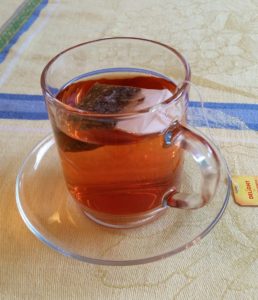 The evidence keeps piling up that certain foods are associated with health, while other foods (e.g., soda, ultra processed foods) are associated with chronic diseases. A recent article reported the results of several studies finding certain foods linked to cardiovascular health, including lowering blood pressure.
The evidence keeps piling up that certain foods are associated with health, while other foods (e.g., soda, ultra processed foods) are associated with chronic diseases. A recent article reported the results of several studies finding certain foods linked to cardiovascular health, including lowering blood pressure.
But guess what? They are popular foods available to everyone - cocoa, green tea, black tea, apples, grapes, and berries.
 There is strong evidence certain plant compounds (flavan-3-ols, also known as flavanols or catechins) in these foods have beneficial effects on cardiovascular health. These compounds can lower blood pressure and improve endothelial function (functioning of the blood vessels). Two to three cups of tea daily! One to two servings of dark chocolate daily! Instead of chips for a snack, have an apple.
There is strong evidence certain plant compounds (flavan-3-ols, also known as flavanols or catechins) in these foods have beneficial effects on cardiovascular health. These compounds can lower blood pressure and improve endothelial function (functioning of the blood vessels). Two to three cups of tea daily! One to two servings of dark chocolate daily! Instead of chips for a snack, have an apple.
By the way, rather than focusing on eating just certain foods, it's better to improve your entire diet by eating more fruits, vegetables, whole grains, legumes, seeds, and nuts. All these foods are linked to good health and are considered part of a heart-healthy diet.
From Medscape: From Apples to Cocoa: Everyday Foods Linked to CV Benefits
The term “healthy diet” is often used but frequently remains vague. This is why scientific research into specific food components with preventive potential is gaining importance. Current studies suggest that certain plant compounds found in everyday foods such as apples, cocoa, and tea may have beneficial effects on cardiovascular (CV) health.
Flavan-3-ols — also known as flavanols or catechins — are a subgroup of flavonoids found in foods such as cocoa, green and black tea, apples, grapes, and berries. Emerging research indicates that these bioactive compounds may lower blood pressure (BP) and improve endothelial function.
The effects of flavan-3-ols on CV health were examined in the large-scale COSMOS trial in 2022, which included more than 21,000 participants. Daily intake of cocoa flavanols was associated with a 27% reduction in CV mortality — an effect not observed with multivitamin supplements.
A meta-analysis of 145 randomized controlled trials with more than 5200 participants also confirmed favourable effects on BP and endothelial function. Average daily intake of 586 mg of flavan-3-ols — the equivalent of about two to three cups of tea or one to two servings of dark chocolate — produced a significant reduction in BP, with a mean decrease of 2.8 mm Hg in systolic BP and 2.0 mm Hg in diastolic BP. In patients with hypertension, the effect was stronger, with reductions of -6 to -7 mm Hg in systolic BP.
In addition, flow-mediated dilation, a measure of endothelial function, improved by an average of 1.7%, even in normotensive participants.
CV benefits of flavan-3-ols were seen not only in patients with hypertension but also in normotensive individuals, especially through improved endothelial function. These findings highlight their potential role in primary prevention.
Globally, hypertension is one of the leading risk factors for CV disease. Lifestyle modifications are the first-line therapy, but practical, food-based recommendations are often lacking. The current evidence helps to fill this gap and supports the use of flavan-3-ol-rich foods as a simple, evidence-based strategy to promote CV health.
Although some studies have investigated isolated flavan-3-ol compounds and dietary supplements, their effects on BP and vascular function were generally less pronounced than those of whole foods such as tea or cocoa. This suggests synergistic effects with other bioactive components in natural sources.
